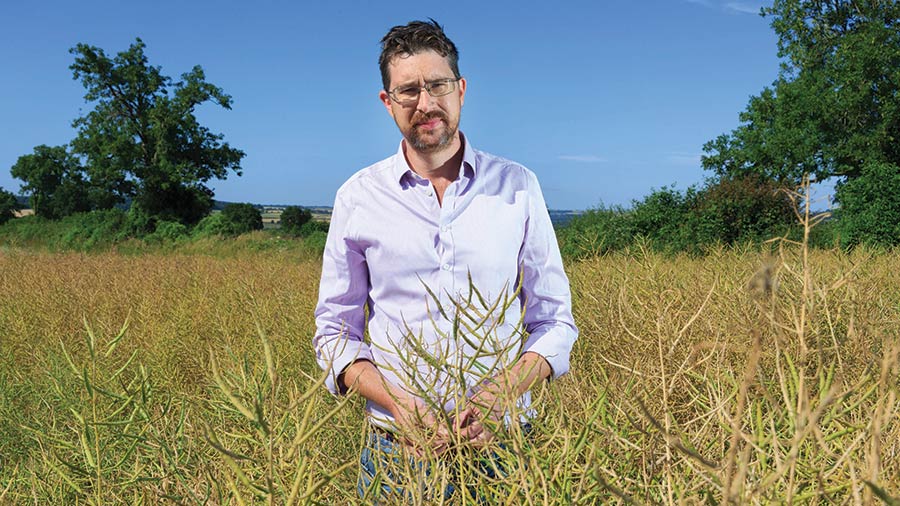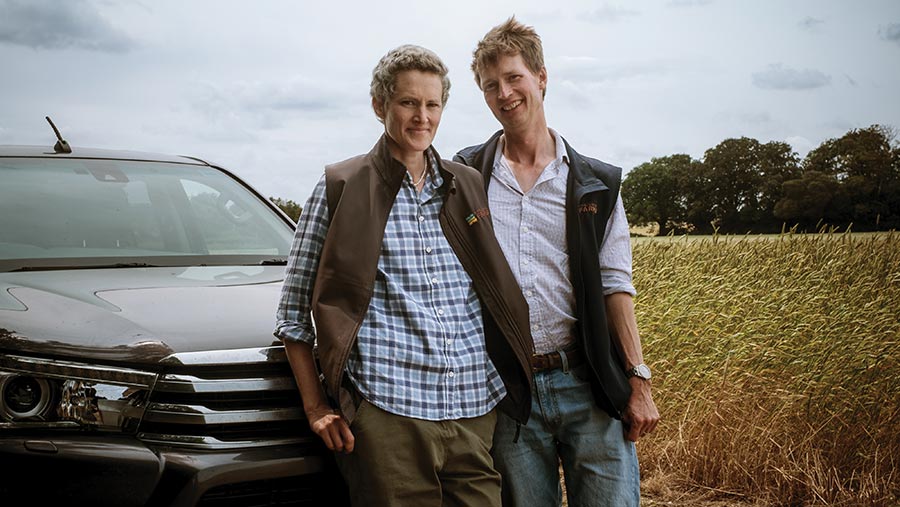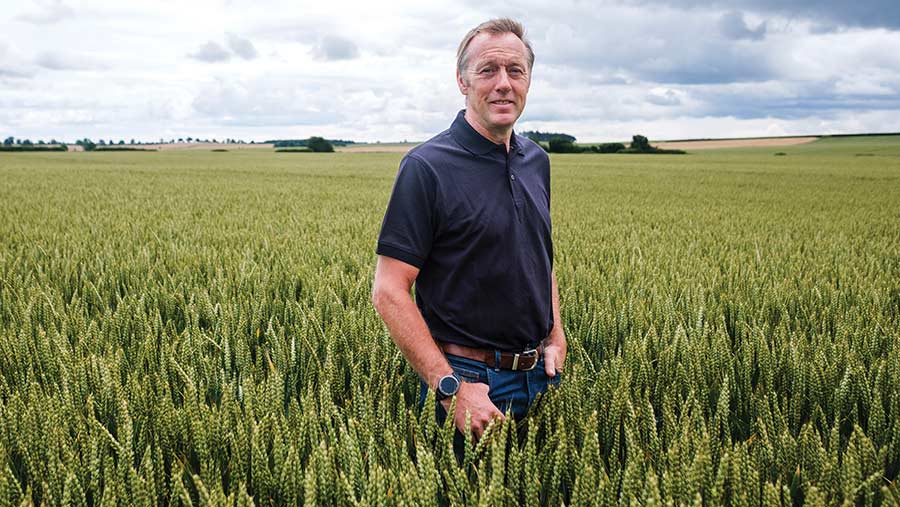Farmers Weekly Awards 2023: Arable Farmer of the Year finalists

All three arable finalists have reduced their cultivations and focused on soil health to future-proof their businesses.
The judges were impressed by how these finalists were willing to try out new systems and innovate on their farms.
See also: The full list of shortlisted farmers for the 2023 Awards
The finalists
James Alexander
Litchfield Farm, Enstone, Oxfordshire
Emma and James Loder-Symonds
Nonington Farms, Goodnestone, Kent
Neil White
Greenknowe Farm, Duns, Scotland
The judges
- Will Oliver, last year’s winner
- Richard Allison, Farmers Weekly‘s arable editor
- Damian McAuley, independent judge and AICC agronomist
James Alexander
Litchfield Farm, Enstone, Oxfordshire

James Alexander, Arable Farmer of the Year finalist 2023 © Tim Scrivener
Farm facts
- Area: 729ha of cropping of which 320ha is organic
- Cropping: Conventional – winter barley, winter wheat and oilseed rape. Organic – wheat, oats and spring barley
- Establishment: 4m Cross Slot and 6m Horsch Sprinter for organic/contract drilling. Plough-based for organic farm
- Soils: Cotswold brash
- Staff: James plus two full-time staff
Organic or conventional cropping? Most growers fall in one camp or the other, but James Alexander is unusual being in both – and the knowledge he has gained is bringing benefits to both systems.
In this corner of Oxfordshire, James faces the challenges of cropping on drought-prone, thin, brashy soils, a greater septoria risk at more than 900ft and plenty of blackgrass.
But despite all these challenges, he has built a thriving and profitable business from scratch by focusing on improving soil health and reducing costly inputs.
See also: Why blackgrass is so bad in 2023 and what to do about it
The business
Back in 2004, he started out as a contractor armed with just a tractor and a Cross-slot drill imported from New Zealand.
Then he took on a 16ha field that had been in six years of set aside, and the owner was so impressed how clean the crop was, James got the whole farm.
He says the secret was not to move soil and that’s still his approach today across the 400ha of conventional cropping.
James’ sustainable no-till system makes use of cover crops, companion crops and long rotations, including grass and clover leys and some livestock.
With soil being just 150mm (6in) deep over rock, spring cropping is risky in a dry year and wheat yields will never hit double digits.
This means his emphasis has been on improving efficiency and managing blackgrass without relying on spring cropping.
On the organic side, ploughing is still needed to manage weeds, although James is looking to reduce cultivations by making the crop work harder.
After a two-year ryegrass/clover fertility-building ley, cropping is winter wheat followed by spring barley and either winter or spring oats before back to the ley.
Achievements
With James’ unique insight managing both organic and conventional systems, both systems have benefited.
For example, his experience of managing the grass/clover ley for fertility building is being used on the AB15 stewardship mix on the conventional side to clean up bad blackgrass fields.
On the organic side, he has a more conventional approach to seed rates so the crop does more of the weed control. He drills at 180-190kg/ha in October and the Dutch openers give as much coverage with tighter rows.
“I don’t own a harrow, I use the crop to do this.”
Soils are becoming more manageable and resilient to drought.
He is building up organic matter with cover crops, chopping straw and a little digestate along with the lack of soil disturbance.
Oilseed rape is yielding an impressive 4-5.5t/ha on one farm and he has developed his own strategy for managing cabbage stem flea beetle.
As yields are limited, his focus has been on reducing inputs while maintaining yields.
He has successfully cut fertiliser use by one-third by feeding soil biology with molasses with every sprayer pass and using variable-rate technology.
This season, James has also cut back on fungicides for his Extase wheat.
He is now reaping the benefits of having healthier soils, with wheat averaging 8.5t/ha last harvest (2022) despite the drought, and only receiving 160kg/ha of nitrogen fertiliser.
The future
Looking ahead, he believes the contract farming model with his sustainable system has a viable future, being profitable without the Basic Payment Scheme (BPS).
He plans to expand, as smaller arable farms struggle to make the investments needed to survive the transition as BPS payments are phased out.
What the judges say
James has successfully built a business from scratch and has a good handle on his costs. He has an excellent understanding of organic and conventional cropping systems and continues to drive both forward.
James Alexander summary
The judges liked
- Built business from scratch
- Good, clean organic crops
- Excellent understanding of both systems
- Good businessman
- Has maintained yields with reduced inputs
The numbers
- 6-7 Average (%) soil organic matter content
- 7-8.5 Average wheat yield (t/ha) on thin Cotswold brash
- 3-4 Average wheat yield (t/ha) on organic ground
- 180 Average nitrogen fertiliser rate (kg/ha) for 2023, one-third less than two years ago
- 185 Average seed rate (kg/ha) for organic wheat
- 320 Area (ha) of cropping grown organically
Emma and James Loder-Symonds
Nonington Farms, Goodnestone, Kent

Emma and James Lodder-Symonds, Arable Farmer of the Year finalists 2023© MAG/Collin Miller
Farm facts
- Area: 1,400ha, of which 160ha owned, plus five contract farms
- Cropping: Milling wheat, winter beans, winter oats, oilseed rape, spring barley, annual cover crops, herbal leys and Countryside Stewardship (CS)
- Establishment: Based on 6m Horsch Sprinter
- Soils: Chalky loam to brickearth
- Staff: Emma and James, three full-timers and two part-timers
Building greater resilience has been a priority for James and Emma Loder-Symonds, as the very changeable weather patterns have become a big challenge for arable cropping in the drier South East.
This has been achieved by adopting a regenerative farming approach focusing on soil health, integrating livestock and striving to maximise profit/ha rather than yields/ha.
And a philosophy of sharing the farm and creating a community is also helping new entrants into farming, as well as creating new opportunities such as direct-selling flour from heritage wheat varieties and lamb.
The business
James recalls that yields were beginning to plateau a bit and in the Higher Level Stewardship areas, as they saw nature return, they started to see benefits on soil and crops.
So, in 2018, they overhauled the system and adopted a regenerative approach and became a Leaf farm.
They focused on profit, rather than just yields/ha, and stacking enterprises on land rather than having one income stream per field.
Nonington Farm, which they own, is where the couple try new things, pushing the boundaries of regenerative farming.
Once proven, practices are then rolled out to the other five farms they contract farm, totalling 1,400ha.
They have a more diverse cropping mix, which now includes milling wheat for a sustainable contract, winter beans, oilseed rape, spring wheat, winter and spring oats, and environmental stewardship in a flexible rotation.
Countryside Stewardship accounts for 20% of the area.
In addition, the couple also have secured private funding from a water company for two-year herbal leys, which are a useful tool for tackling any grassweed problems.
Achievements
Over the past few years, they have become carbon negative and have increased biodiversity across the farm.
The emphasis on profit rather than yield has seen increased profitability while maintaining yields, with wheats averaging more than 11.37t/ha in 2022.
At the same time, inputs have been reduced, with variable costs falling from £600/ha in 2018 to just over £400/ha in 2022, although price rises saw this edge back to £512/ha this harvest.
Diesel use has fallen to 72 litres/ha, down from 100 litres/ha in 2018 and a more efficient use of fertiliser has seen its use down by a half.
Currently, 25% of their crops attract an additional premium for being sustainably produced and they are developing new markets too, milling their own flour from heritage wheat varieties such as Old Kent Red.
They are also passionate about the wider community and are supporting new starters.
They have a grazier who has started in farming and their aim is to have one on each of the farms.
They also have a graduate growing vegetables in one field corner supplying local restaurants, fitting with the farm’s flour.
Part of their ethos of sharing the farm, Emma and James are involved in three cluster groups that they founded with Natural England, including the Barnham Downs East Kent group.
And if that isn’t enough to do, Emma’s background in teaching and passion to engage with the community has seen them host more than 1,500 visitors a year of all ages.
The future
While the couple have made huge strides in making the business more resilient, they have an ambitious target of cutting inputs by another 50% by further increasing soil health and mechanical weeding to cut herbicide use.
In addition, they plan to eliminate the need for artificial fertiliser and develop a sustainable way to grow milling wheat.
What the judges say
Emma and James have embraced the challenge of adopting a regen system and have created a profitable business. Their efforts to help the younger generation and engage the wider community are impressive.
Emma and James Lodder-Symonds summary
The judges liked
- Encouraging next generation of farmers
- Profitable arable business
- Engaging with local community and schools
- Willing to try new approaches
- Developing new local markets, such as flour from heritage grain
The numbers
- 13.8 Nitrogen use efficiency (kg of N/t wheat)
- 11.37 Average first wheat yield (t/ha) for harvest 2022
- 1,500 Number of visitors typically hosted each year
- 1,000 Length of hedgerow (m) planted each year
- 72 Diesel use (litres/ha) in 2021
- 512 Variable costs (£/ha) in 2023
Neil White
Greenknowe Farm, Duns, Scotland

Neil White, Arable Farmer of the Year finalist 2023 © Joe Summerville
Farm facts
- Area: 238ha of cropping (150ha owned)
- Cropping: Winter feed wheat, winter brewing barley, high erucic acid oilseed rape, milling oats, tic beans and spring malting barley
- Establishment: Based on 3m Mzuri strip-till drill
- Soils: Sandy loam to clay loam
- Staff: Neil, plus harvest help
In an area where ploughs and power harrows dominate, Neil White made the bold move to ditch his and adopt a strip-till system as he strives to be “profitable without subsidy”.
Although the plough and power harrow system wasn’t broken, he was spending too much time and diesel moving soil and wanted to move his farm on.
Today, yields are higher and soils are healthier.
The business
The family farm saw the last of the livestock in 1999 and focused on growing more quality arable crops. Neil does all the farm work himself, except for the corn carting, high-clearance spraying and baling.
However, being on his own, he was struggling to cope with the workload at key times and changes had to be made.
So the challenge was to produce top-quality crops without the plough.
He watched regen farmer Jake Freestone’s video on regen farming and decided to give it a try.
In 2014, he had a demo strip-till drill establishing winter wheat after OSR and it proved so successful that the following year he invested in a 3m Mzuri and drilled 20% of his area.
He took a gradual approach to ensure soils were ready for the change and this season was the first when everything was strip-tilled.
While he grows top-quality feed wheat, he adds value to the rest of his crops with winter brewing and spring malting barley, oats for Quaker, premium-earning high-erucic acid rapeseed and tic beans, which are bagged on farm for racing pigeons.
He has focused on reducing costs and is making use of technology such as variable-rate seeding, slug pelleting and liming.
Achievements
Yields have increased and, last harvest, his wheat averaged more than 10.5t/ha with a nitrogen rate of 175kg/ha. He is now using one-third of the fuel – 14 litres/ha – to establish wheat and one-third of the time.
Soils are healthier with better workability and organic matter percentages are in the 4s instead of 3s.
Headlands are improving with less compaction, and better soil biology means chopped straw has all broken down and is gone by spring.
For wheat, variable plus fixed costs are £155/t, spray costs £185/ha and labour costs are an impressive £14/ha.
This year, he cut a fungicide spray by opting for wheat varieties with high untreated yields – Dawsum, Champion and Extase.
Using less diesel along with using OSR straw in a biomass boiler has helped reduce his carbon footprint, which stands at 0.33kg of carbon dioxide equivalents/kg of produce.
The environment has also benefited with the addition of grass margins, beetle banks, species rich grassland and companion cropping in the oilseed rape. No insecticides are used on pulses.
Neil is also successfully using cover crops, despite the later harvests in Scotland, being a mix of spring beans, phacelia, radish and clover.
He is also passionate about spreading the word. Even though he is only a one-man team, he sees the value in social media, organising demos and working with NFU Scotland.
The future
In conclusion, Neil has seen a great improvement in the biodiversity and crop health on his farm without sacrificing output.
He has demonstrated that it’s possible to grow top-quality cereals in the Scottish Borders without the plough and power harrow.
He has become the go-to strip-till expert in the area and is spreading the word to inspire other local farmers to start their own reduced tillage journey.
What the judges say
Neil is a good ambassador for the industry as he inspires others. The farm is very impressive with excellent-looking crops showing how successful his journey has been to a non-plough approach.
Neil White summary
The judges liked
- Excellent-looking crops and attention to detail
- A good communicator and inspires others
- Open-minded and willing to try new innovations
- Achieving a lot on his own
- Profitable system without subsidy
The numbers
- 10.2 Current average wheat yield (t/ha), up from 9.3
- 14 Fuel use (litres/ha) for establishment
- 185 Input costs (£/ha) for the wheat crop
- 4.5 High erucic acid rapeseed yield (t/ha) last harvest
- 0.32 Carbon footprint (kg/kg of produce) at Greenknowe Farm
- 8 Number of years since starting with strip-till across 20% of his area
The FW 2023 Arable Farmer of the Year is sponsored by Fendt
Sponsor’s message

“Fendt are proud to sponsor the Arable Farmer of the Year category at this year’s Farmers Weekly Awards. Congratulations to the three finalists, who all demonstrate a committed, innovative and adaptive approach to farming.”
Edward Dennett, marketing manager, Fendt

